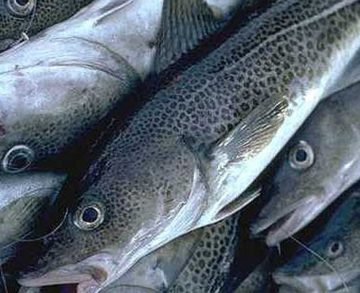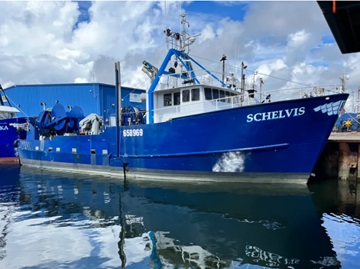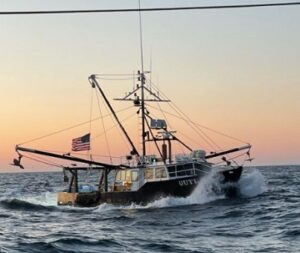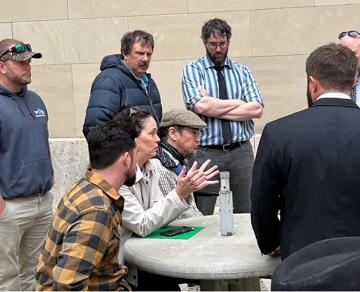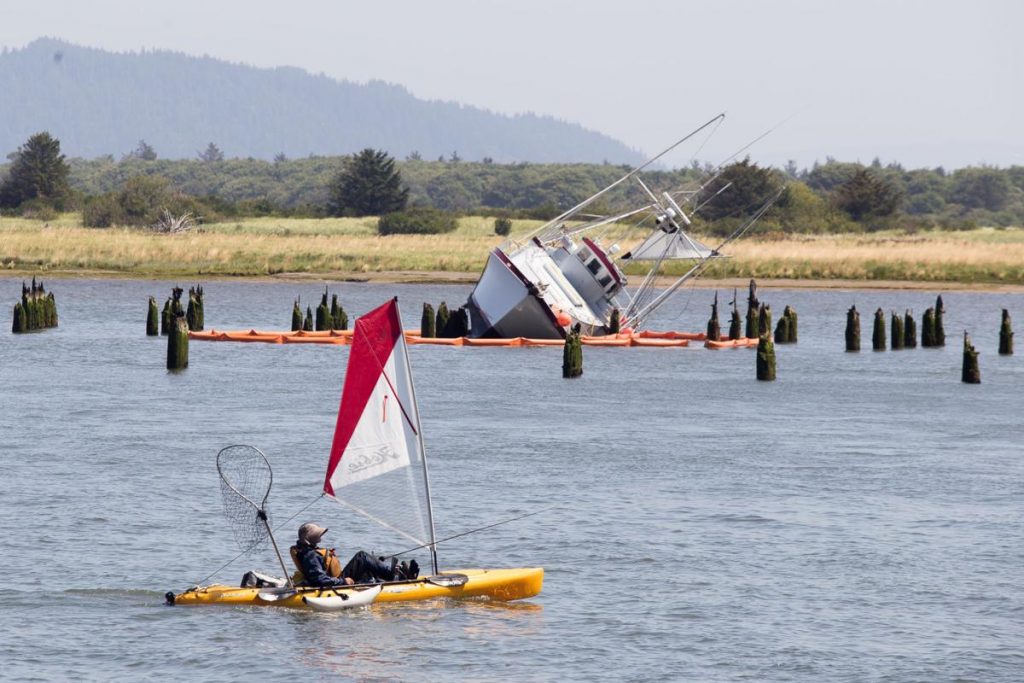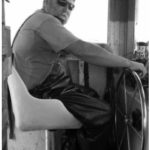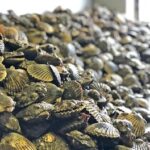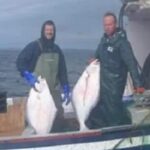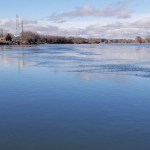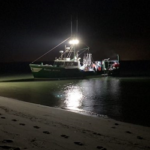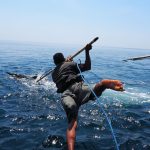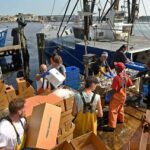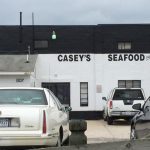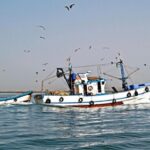Tag Archives: Blue Harvest Fisheries
An ocean of ambition
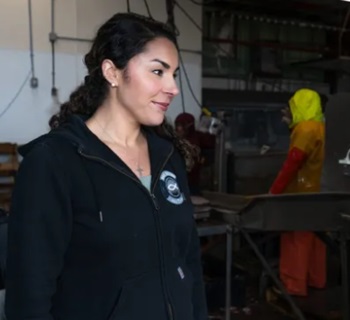 One by one, a trustee listed the assets up for sale: eight commercial fishing vessels and 48 federal fishing permits. It was a fire-sale liquidation for bankrupt Blue Harvest Fisheries — one of New England’s largest seafood companies — and the largest bundle of groundfish permits in recent history to come available on the market. Bids, the trustee announced, would start at $10 million. Cassie Canastra was first to act: “$11 million,” she said, without skipping a beat. There was a brief pause, as a team representing O’Hara Corporation, part owner of New Bedford-based scallop giant Eastern Fisheries, huddled to discuss their options. They raised the bid to $11.25 million. “$12 million,” Canastra responded, showing no sign of relenting. Photos, more, >>click to read<< 11:03
One by one, a trustee listed the assets up for sale: eight commercial fishing vessels and 48 federal fishing permits. It was a fire-sale liquidation for bankrupt Blue Harvest Fisheries — one of New England’s largest seafood companies — and the largest bundle of groundfish permits in recent history to come available on the market. Bids, the trustee announced, would start at $10 million. Cassie Canastra was first to act: “$11 million,” she said, without skipping a beat. There was a brief pause, as a team representing O’Hara Corporation, part owner of New Bedford-based scallop giant Eastern Fisheries, huddled to discuss their options. They raised the bid to $11.25 million. “$12 million,” Canastra responded, showing no sign of relenting. Photos, more, >>click to read<< 11:03
Massachusetts: Lawmakers call for answers in wake of Blue Harvest Fisheries bankruptcy sale
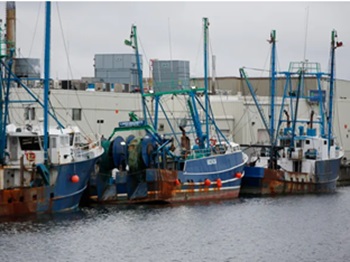 Questions continue to surround the bankruptcy and sale of Blue Harvest Fisheries, the largest groundfish operation in New England, including its impact on the New Bedford fishing industry. The New Bedford company filed for Chapter 7 bankruptcy in September 2023. For U.S. Senators Elizabeth Warren (D-Mass) and Edward Markey (D-Mass) and Rep. William Keating (D-Mass) it’s part of a pattern, and they are seeking answers from Bregal Partners, a Dutch-owned private equity firm, and Blue Harvest’s majority equity holder that owned 89.5 percent of the company. more, >>click to read<< 08:05
Questions continue to surround the bankruptcy and sale of Blue Harvest Fisheries, the largest groundfish operation in New England, including its impact on the New Bedford fishing industry. The New Bedford company filed for Chapter 7 bankruptcy in September 2023. For U.S. Senators Elizabeth Warren (D-Mass) and Edward Markey (D-Mass) and Rep. William Keating (D-Mass) it’s part of a pattern, and they are seeking answers from Bregal Partners, a Dutch-owned private equity firm, and Blue Harvest’s majority equity holder that owned 89.5 percent of the company. more, >>click to read<< 08:05
Warren, Markey and Keating demand answers from Blue Harvest owners
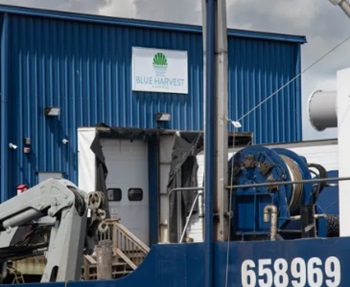 “After years of putting private equity profits ahead of workers and small businesses, Bregal Partners — which owned and stripped Blue Harvest of its assets — owes the community an explanation,” wrote Sen. Elizabeth Warren, Sen. Ed Markey and U.S. Rep Bill Keating. They each signed the joint letter addressed to Gene Yoon, managing partner of Bregal Partners, which owned 89.5% of New Bedford-based seafood giant Blue Harvest Fisheries prior to the company declaring bankruptcy in September of 2023. “Bregal’s actions with respect to Blue Harvest have left local small businesses and workers holding the bag after your firm spent years price gouging, mistreating workers, saddling consumers with junk fees, and stripping assets,” the letter continued. “Your actions have harmed New England’s fishing industry and left over 1,000 independent contractors, businesses, and other creditors saddled with debt.” more, >>click to read<< 07:18
“After years of putting private equity profits ahead of workers and small businesses, Bregal Partners — which owned and stripped Blue Harvest of its assets — owes the community an explanation,” wrote Sen. Elizabeth Warren, Sen. Ed Markey and U.S. Rep Bill Keating. They each signed the joint letter addressed to Gene Yoon, managing partner of Bregal Partners, which owned 89.5% of New Bedford-based seafood giant Blue Harvest Fisheries prior to the company declaring bankruptcy in September of 2023. “Bregal’s actions with respect to Blue Harvest have left local small businesses and workers holding the bag after your firm spent years price gouging, mistreating workers, saddling consumers with junk fees, and stripping assets,” the letter continued. “Your actions have harmed New England’s fishing industry and left over 1,000 independent contractors, businesses, and other creditors saddled with debt.” more, >>click to read<< 07:18
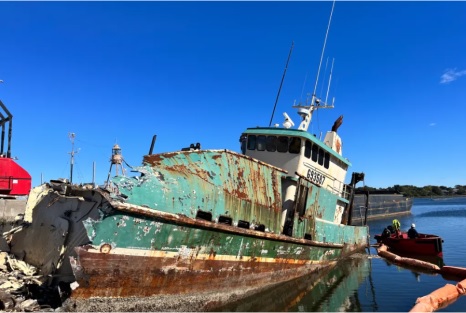
‘Codfather’ Rafael’s fleet scrapped amid Blue Harvest bankruptcy
By Monday, the only trace of the Ilha Brava II was the keel. It remains barely floating in the harbor — a testament to the tattered, sunken legacy of two of the largest fishing empires on the East Coast, both of which had owned the vessel and both of which met their demise in court. Neither seafood giant ended its reign with a balanced bank account. Rafael would return to New Bedford a rich man upon his release from prison in 2021, pocketing the $100 million he received from the government-mandated sale of his fabled fleet. The private equity firm that owns Blue Harvest Fisheries, on the other hand, is now claiming in bankruptcy court that it stands to lose over $200 million from its foray into the fishing industry. It also owes millions to countless small businesses on the New Bedford waterfront. “They said it would be no problem to fill my shoes,” Rafael said, speaking over the phone in an interview, “They filled my shoes, all right. They f—ed people for millions of dollars. That’s how they filled my shoes.” Photos, >>click to read<< 08:11
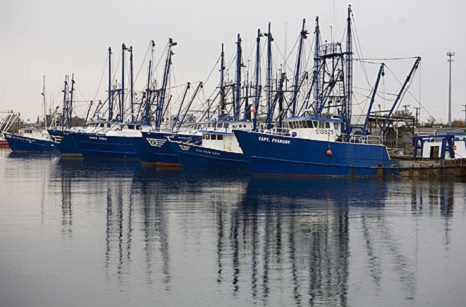
Popular food brand files Chapter 7 bankruptcy, heads to liquidation
With private companies, the end can be more sudden. That’s especially true when the company isn’t consumer-facing like a wholesaler or a manufacturer. Blue Harvest Fisheries may not be a name everyone knows, but it was a massive operation that was intended at its 2015 creation to dominate the New England fishing industry. That was a bold goal that it never achieved. And now, after suspending its fishing operations in September, the company has filed for Chapter 7 bankruptcy and appears headed toward liquidation. The company, which sold fish to a number of grocery chains around the country, had a bold mission statement. Blue Harvest vendors, workers face bad news. Under a Chapter 7 filing, a company’s assets will be liquidated and used to pay off creditors. “No property appears to be available to pay creditors,” >>click to read/comment<< 15:48
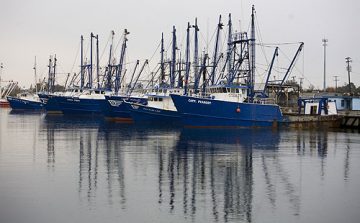
Blue Harvest bankruptcy leaves millions in unpaid debt to local businesses
For Blue Harvest and Bregal Partners — which is part of a fund with over $18 billion under management — the $50,000 or so owed to Bendiksen is a small fraction of the debts the company had racked up during its eight-year roll up of the New Bedford fishing industry. But for Bendiksen, he said the notice that he will not be paid spells a serious financial blow. And he’s not alone. More than 1,000 independent contractors and companies will be left holding the bag as the private-equity backed fishing venture goes belly up, according to a list of creditors published in the bankruptcy filings. It includes many fishermen who had worked for Blue Harvest and countless small businesses on the New Bedford waterfront: welders, mechanics, supply stores and shipyards. >>click to read<< 11:20
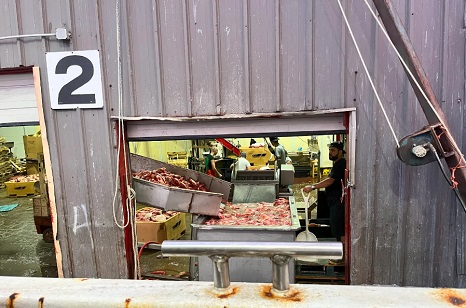
Blue Harvest to shut down, ending reign over New England groundfish
Blue Harvest Fisheries is set to shut down all fishing operations on Friday, its fishermen were told this week. It marks the last in a cascade of sales and closures for the billionaire-backed business venture that once aimed to “dominate” the New England fishing industry but ended up overcapitalized and belly up on the dock. The company launched in 2015, flush with private equity capital, and expanded at a rapid clip to become the single-largest groundfish permit holder in New England. It still owns the permits and vessels, but seafood industry sources say, after the shut down, a quick sale or bankruptcy filing is likely. “A big rise leads to a big fall,” said Luke deWildt, captain of the Teresa Marie IV, >>click to read<< 07:52
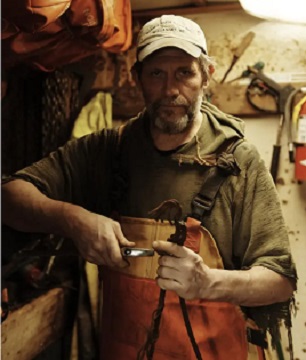
How foreign private equity hooked New England’s fishing industry
The 85-foot trawler, deep green and speckled with rust, was returning from a grueling fishing trip deep into the Atlantic swells. As sunrise broke over New Bedford harbor, the fish were offloaded in plastic crates onto the asphalt dock of Blue Harvest Fisheries, one of the largest fishing companies on the East Coast. About 390 million pounds of seafood move each year through New Bedford’s waterfront, the top-earning commercial fishing port in the nation. Leeman and his crew are barely sharing in the bounty. On deck, Leeman held a one-page “settlement sheet,” the fishing industry’s version of a pay stub. Blue Harvest charges Leeman and his crew for fuel, gear, leasing of fishing rights, and maintenance on the company-owned vessel. Across six trips in the past 14 months, Leeman netted about 14 cents a pound, and the crew, about 7 cents each — a small fraction of the $2.28 per pound that a species like haddock typically fetches at auction. Photos, >click to read< 12:04
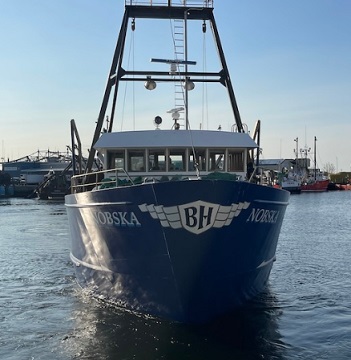
Blue Harvest Fisheries’ Newest Vessel, F/V Nobska, Successfully Completes First Series of Fishing Trips
The newest, most modern vessel in the New England groundfish fishery, the F/V Nobska, has returned to port after its successful inaugural deployment. The vessel was acquired earlier this year by Blue Harvest Fisheries, as part of the company’s investment in the future of its groundfish operations. The Nobska embarked on four back-to-back trips between April 7 and May 10, and landed 335,000 pounds of fish in its home port of New Bedford, Massachusetts, with additional landings in Gloucester, Massachusetts. The catch included several groundfish species, including monkfish, flounder, haddock, Acadian redfish, hake, and pollock. A series of three to four back-to-back trips, followed by a short break for maintenance and crew rest, is a typical operational plan for this vessel. Video, photos, >click to read< 07:45
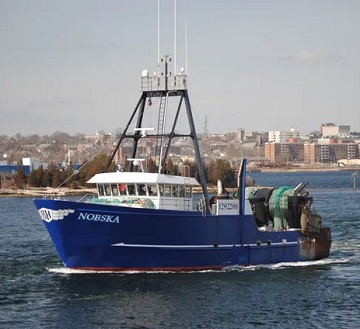
Groundfish operations change focus for New Bedford seafood company
While a local supplier of seafood continues its efforts to focus exclusively on groundfish and upgrade and modernize its fleet, it has announced the temporary closure of the processing facility it operates in New Bedford, resulting in layoffs to 64 employees. Blue Harvest Fisheries will be upgrading and modernizing its fleet as part of a shift in strategy to realize the potential of its groundfish operations and continue focusing exclusively on groundfish. While originally focused on acquiring assets in the scallop fishery, Blue Harvest Fisheries President Chip Wilson said management became aware of a unique situation in the ground fishing industry, an industry that has been depressed in New England since the late 1980s. >click to read< 12:35
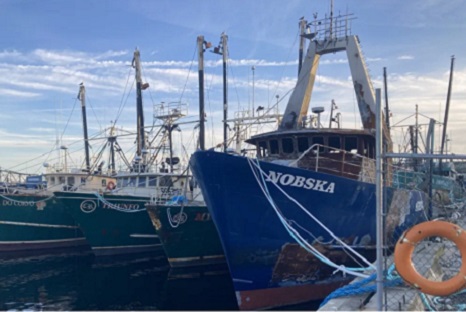
Blue Harvest doubles down on groundfish, after selling off scallop fleet
Blue Harvest Fisheries announced this week that it has purchased a new trawler, expanding its groundfish operations as the company sells off the last of its scallop fleet. The 91-foot trawler, originally called the Francis Dawn, will be renamed the Nobska. It replaces a different Blue Harvest vessel, also named the Nobska, which burned at sea in 2021. The charred and gutted vessel has been tied to the company’s dock on Herman Melville Boulevard in New Bedford ever since — declared a total loss at an estimated $2.4 million. >click to read< 07:18

Untangling catch shares with Lee van der Voo – Catch shares have changed fisheries and fishing communities across the U.S.
I recently saw some great reporting by the New Bedford Light and ProPublica about how the billionaire Dutch family that owns Blue Harvest Fisheries has emerged as a force in groundfish fishing off the coast of Massachusetts. These are very wealthy, powerful equity groups and corporations that are acquiring access to the fisheries and passing the cost of owning them and fishing them onto fishermen. There’s been profound disenfranchisement of people who used to have a more personal stake in fishing and seafood. Everyone from indigenous communities in Southwest Alaska whose history with halibut goes back to the beginning of time to small-boat, family operations around the United States everywhere have been losing access. Whole communities have fallen apart over that. >click to read< 08:15
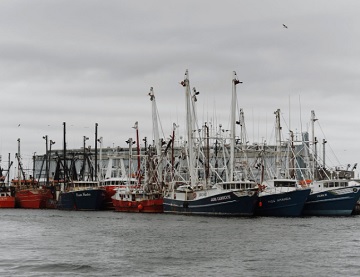
DOJ Digs Into “Competition Concerns” in New England Fishing Industry
The U.S. Department of Justice has begun looking at possible antitrust issues in the New England fishing industry, amid growing concern about consolidation and market dominance by private equity investors. One such firm is Blue Harvest Fisheries, which operates out of New Bedford, Massachusetts, and is the largest holder of permits to catch groundfish such as pollock, haddock and ocean perch. The investigation traced the company’s ownership to a billionaire Dutch family via a private equity firm. Over the past seven years, records show, the company has purchased the rights to catch 12% of groundfish in the region, approaching the antitrust cap of 15.5%. It further boosts its market share by leasing fishing rights from other permit owners. >click to read< 07:50
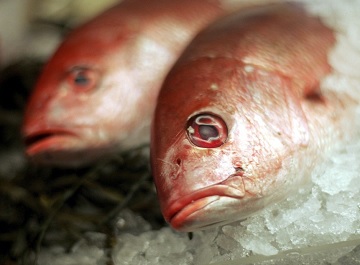
Catch Shares Enable Wealthy Landlords to Gobble Up Local Fisheries
A recent investigative report has reignited public discussion over catch shares, a controversial approach to fisheries management that privatizes the rights to fish. The investigation exposed how Blue Harvest Fisheries, owned by a billionaire Dutch family, became the largest holder of commercial fishing rights in New England, benefiting from lax antitrust regulations and pilfering profits from the local fishermen who work under them. As a commercial fisherman in Mississippi, I know these dynamics go well beyond New England. Here in the Gulf of Mexico, private equity firms and other large investors have come in and gobbled up the rights to fish, driving up the cost of fishing access and making it prohibitively expensive for fishermen like me to harvest fish in our own backyards. >click to read< 07:55
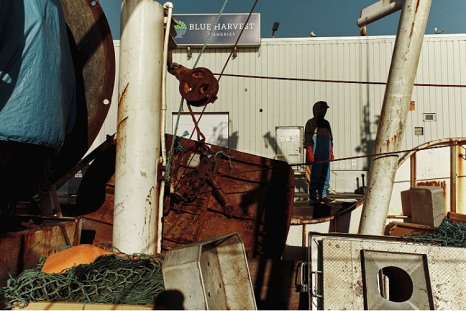
Senators Demand Federal Scrutiny of Private Equity’s Incursion Into Fishing
Three U.S. senators, including two members of a Senate subcommittee that oversees the fishing industry, are calling for greater federal scrutiny of private equity’s incursion into East Coast commercial fishing. The ProPublica/New Bedford Light investigation found that a federal regulatory system known as “catch shares,” which was adopted in 2010 to reduce overfishing, has fostered private equity’s consolidation of the industry at the expense of independent fishermen. The single largest permit holder in the New England groundfish industry is Blue Harvest Fisheries, which has rights to catch 12% of groundfish, approaching the antitrust cap of 15.5%. The current antitrust cap “fails to prevent excessive consolidation in the fishery,” said Geoff Smith, one of 18 members of the New England Fishery Management Council, which advises NOAA. >click to read< 10:23
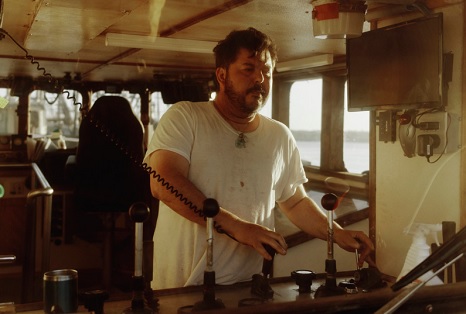
How Foreign Private Equity Hooked New England’s Fishing Industry
Before dawn, Jerry Leeman churned through inky black waters, clutching the wheel of the fishing vessel F/V Harmony. The 85-foot trawler, deep green and speckled with rust, was returning from a grueling fishing trip deep into the Atlantic swells. Leeman and his crew of four had worked 10 consecutive days, 20 hours a day, to haul in more than 50,000 pounds of fish: pollock, haddock and ocean perch, a trio known as groundfish in the industry and as whitefish in the freezer aisle. Leeman and his crew are barely sharing in the bounty. On deck, Leeman held a one-page “settlement 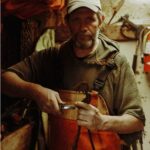 sheet,” the fishing industry’s version of a pay stub. Blue Harvest charges Leeman and his crew for fuel, gear, leasing of fishing rights, and maintenance on the company-owned vessel. Across six trips in the past 14 months, Leeman netted about 14 cents a pound, and the crew, about 7 cents each — a small fraction of the $2.28 per pound that a species like haddock typically fetches at auction. >Photos, click to read< 08:01
sheet,” the fishing industry’s version of a pay stub. Blue Harvest charges Leeman and his crew for fuel, gear, leasing of fishing rights, and maintenance on the company-owned vessel. Across six trips in the past 14 months, Leeman netted about 14 cents a pound, and the crew, about 7 cents each — a small fraction of the $2.28 per pound that a species like haddock typically fetches at auction. >Photos, click to read< 08:01
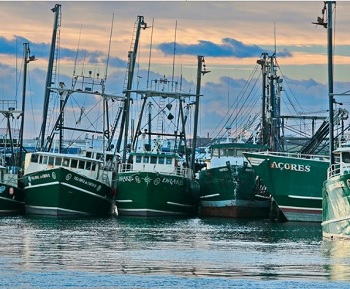
Lawsuit filed by Quinn Fisheries and Blue Harvest Fisheries against Carlos Rafael’s trustee and three arbitrators
Quinn Fisheries and Blue Harvest Fisheries filed a lawsuit last week against Carlos Rafael’s trustee and three arbitrators, alleging they are blocking a multimillion-dollar transaction of vessels and permits that was scheduled to happen April 16. The permits are for scallops and multi-species fish. The fishing seasons have already started or will soon start and because the transaction cannot be finalized, Quinn Fisheries and Blue Harvest state they will experience serious and irreparable financial harm. According to the 19-page complaint, Quinn Fisheries planned to transfer certain vessels and permits to Blue Harvest, and then purchase vessels and permits from Blue Harvest. >click to read< 11:08
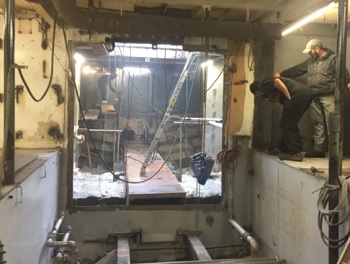
Five Years After His Indictment, Carlos Rafael’s Fishing Vessels Are Part of a New Era in New Bedford
It’s been a little more than a year since this vessel was among the last big group of fishing boats sold off from the fleet of Carlos Rafael, the man known in the New Bedford fishing industry as “the Codfather.” Rafael went to prison in 2017 for dodging catch limits, smuggling profits overseas, and evading taxes. Some of his former vessels have become part of a new era on the New Bedford waterfront that started before he was indicted but has accelerated in the five years since, Blue Harvest Fisheries bought 12 of Rafael’s groundfish boats, including the Glaucus, last year. >click to read< 09:01
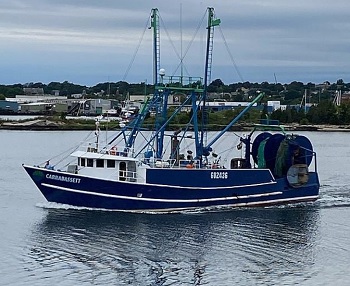
Blue Harvest Refitted Codfather Trawlers going into service
Blue Harvest Fisheries this week launched the Carrabassett, the second of three refitted groundfish vessels the company is putting into service this year. The 78-foot trawler was once painted “Carlos Rafael green” and emblazoned with the “CR” logo. Now it’s refurbished, repaired, upgraded, painted deep blue, and decorated with Blue Harvest’s distinctive scallop logo. Blue Harvest purchased 12 vessels and 27 fishing permits from Rafael’s family in February. Rafael, who made millions by gaming the system before he was busted by federal agents, was ordered last year by a judge to get out of the fishing business forever and divest his holdings. >click to read< 19:08
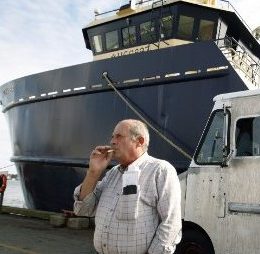
Carlos “Codfather” Rafael settlement rankles local fishermen
By the start of the new fishing year on May 1, Carlos Rafael, once owner of one of the largest fishing fleets in the country and known as the “Codfather” will officially be little more than a memory on the New Bedford waterfront. According to his attorney John Markey, Rafael will have sold off all of his fishing empire as part of a settlement agreement with the National Oceanic and Atmospheric Administration, and will be out of the fishing industry forever. >click to read< 20:32

New Bedford seafood auction stops sale of Rafael’s boats to Blue Harvest
The fate of Carlos Rafael’s groundfishing vessels is still uncertain, with companies jockeying to get their hands on what’s left of the Codfather’s fleet. According to the CEO of Blue Harvest Fisheries Keith Decker, the company signed a purchase and sale agreement for Rafael’s groundfish vessels, but the agreement was subject to a 30-day Right of First Refusal Period, allowing other members of Rafael’s former sector a chance to match or better the bid. Buyers and Sellers Exchange (BASE) exercised that right, Decker said, “We were notified by Rafael’s attorney on Friday evening.” >click to read< 22:15
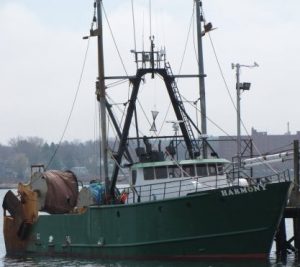
Fleet of 5 Maine scallop and fishing trawlers sold to New York-based equity firm
A New York-based private equity firm will purchase a Portland scallop and groundfish supply company that manages five of the largest fishing vessels operating in Maine. Blue Harvest Fisheries, a U.S. scallop and whitefish supplier owned by equity firm Bregal Partners, will purchase Atlantic Trawlers Fishing, Undercurrent News reported. Bregal Partners is a private investment firm with $600 million of committed capital funded by a six-generation German-Dutch family. Its board of directors includes the CEO of Bumble Bee Foods, and the chief investment and strategy officer of the Central Bering Sea Fisherman’s Association, who is also on the board of American Seafoods. Atlantic Trawlers Fishing, owned by James Odlin, operates from the Portland Fish Pier and includes the fishing vessels Nobska, Morue, Harmony, Teresa Marie III and Teresa Marie IV. >click to read>16:57
Don Cuddy: Blue Harvest a major new presence among city fish houses
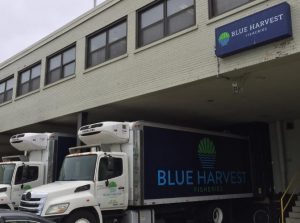 New Bedford is the top-grossing fishing port in the United States and has been since 1999; an enviable record and a tribute to the vision and expertise of all those involved in sustaining an industry that is constantly evolving. While industry momentum has not flagged, the players come and go as markets shift, regulations change and fish stocks rise or fall. Seafood processor Blue Harvest Fisheries is a big presence on the waterfront today yet the company was unknown in the city until relatively recently. So last week I had a chat with CEO and Acushnet native Jeff Davis, a 30-year veteran of the seafood industry, to learn more about Blue Harvest and all that they do. click here to read the story 20:06
New Bedford is the top-grossing fishing port in the United States and has been since 1999; an enviable record and a tribute to the vision and expertise of all those involved in sustaining an industry that is constantly evolving. While industry momentum has not flagged, the players come and go as markets shift, regulations change and fish stocks rise or fall. Seafood processor Blue Harvest Fisheries is a big presence on the waterfront today yet the company was unknown in the city until relatively recently. So last week I had a chat with CEO and Acushnet native Jeff Davis, a 30-year veteran of the seafood industry, to learn more about Blue Harvest and all that they do. click here to read the story 20:06
Blue Harvest Fisheries will acquire the assets of High Liner’s scallop business along with its facility in New Bedford
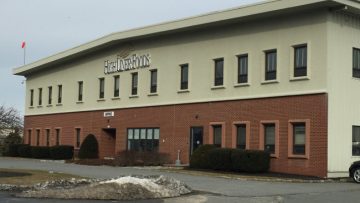 Canada-listed High Liner Foods has agreed to sell its scallop business to US group Blue Harvest Fisheries. Under the terms of the deal, Blue Harvest will acquire the assets of High Liner’s scallop business, along with its facility in New Bedford, Massachusetts. High Liner will receive cash proceeds of US$8m for the business and facility, plus additional amounts for scallop inventories. High Liner said it will continue to offer scallops to its customers through a supply agreement with Blue Harvest. The transaction is expected to close within the next several weeks. High Liner had announced in February it would stop value-added fish operations at the New Bedford facility to reduce excess capacity across its production network in North America. Blue Harvest was formed last year with the acquisition of eight Virginia-based scallop vessels and related shore assets from US scallop fishing firm Peabody Corporation. Its acquisition of the High Liner asset is the third Bue Harvest has made in 2016. Read the rest here 14:20
Canada-listed High Liner Foods has agreed to sell its scallop business to US group Blue Harvest Fisheries. Under the terms of the deal, Blue Harvest will acquire the assets of High Liner’s scallop business, along with its facility in New Bedford, Massachusetts. High Liner will receive cash proceeds of US$8m for the business and facility, plus additional amounts for scallop inventories. High Liner said it will continue to offer scallops to its customers through a supply agreement with Blue Harvest. The transaction is expected to close within the next several weeks. High Liner had announced in February it would stop value-added fish operations at the New Bedford facility to reduce excess capacity across its production network in North America. Blue Harvest was formed last year with the acquisition of eight Virginia-based scallop vessels and related shore assets from US scallop fishing firm Peabody Corporation. Its acquisition of the High Liner asset is the third Bue Harvest has made in 2016. Read the rest here 14:20






